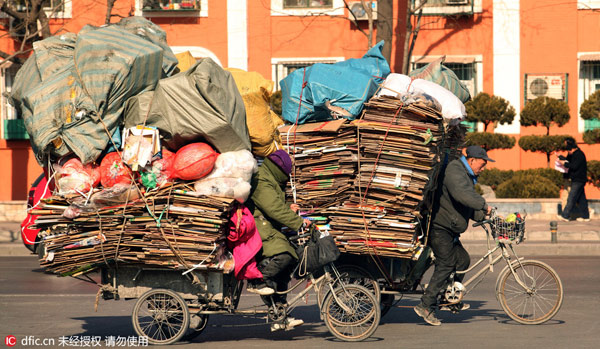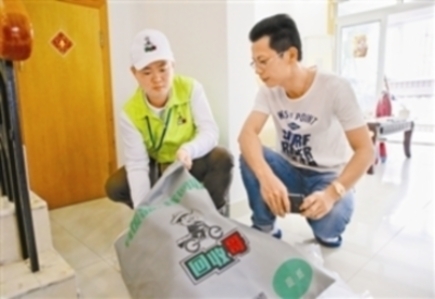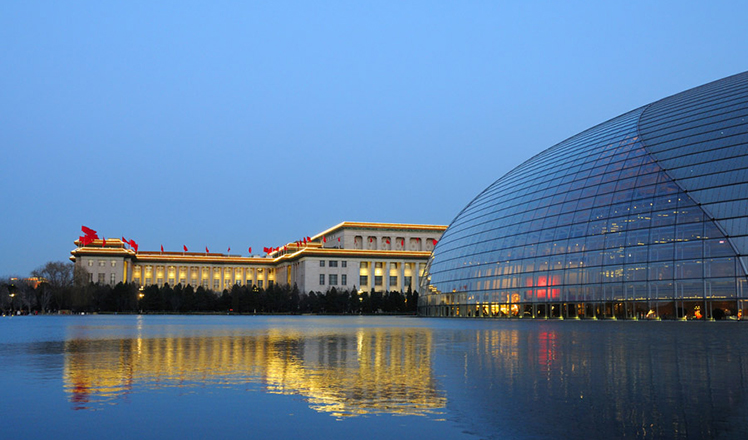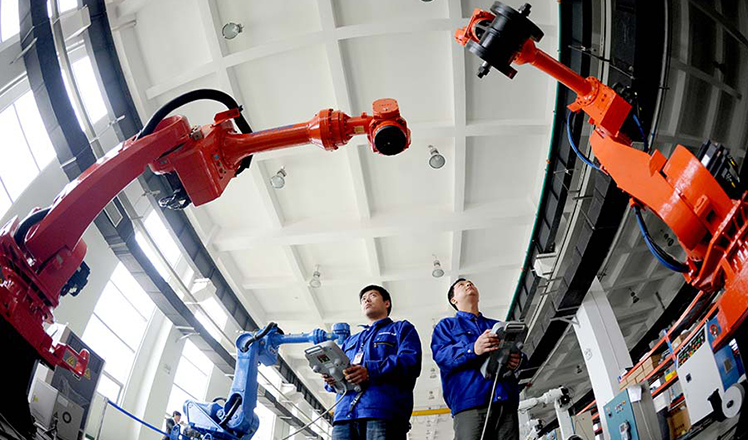O2O app helps upgrade recycling in China
Updated: 2016-03-11 15:10
By Ma Chi(chinadaily.com.cn)
|
||||||||
 |
|
Trash collectors in Beijing peddle their over-laden tricycles piled high with recyclable trash to a waste collection agency. [Photo/IC] |
"It is even worse in bad weather when going out becomes difficult for me," said the 60-year-old.
But a new O2O (online-to-offline) application has changed the attitudes of people like Wu towards waste sorting and recycling.
New platform
Ever since he began using Bangdaojia, an application that allows users to request a garbage pickup on their smart phones, Wu has been spared the effort to find waste collectors on the street or drive miles to the nearest waste collection agency.
The O2O platform also helps trash collectors locate their customers. The developer of the app, Beijing Incom Resources Recovery Co Ltd, offers trash collectors formal employment and allows them to provide door-to-door services by appointment.
Jin Yuhua and her husband have worked as trash collectors since they moved from Shandong province to Beijing in 1997. Life is hard for them – in sweltering heat and freezing cold, they sit on an old tricycle outside a housing compound, waiting for someone to sell them rubbish with tradable value.
 |
|
A worker of O2O waste collection Recycling Brother offers door-to-door services in Shenzhen, South China's Guangdong province. [Photo/szews.com] |
Since using the app, the couple went from aimlessly wandering in the street to offering door-to-door services by receiving orders on the O2O platform.
In addition to providing a platform to link customers and trash collectors, the O2O application is also changing the final destination of the rubbish, Incom general manager Chang Tao told Xinhua News Agency.
Garbage collectors are the start of the long recycling chain. They usually sell garbage to small waste collection agencies, which will resell it to recycling enterprises. As the costs for processing recyclable materials is high for licensed recycling enterprises, says Chang, the prices they offer are less competitive than unlicensed agencies. As a result, a lot of garbage goes to underground collection and processing centers.
"I have been to some illegal processing centers on the outskirts of Beijing that exude a pungent smell. They don't have sewage treatment or proper environmental protection facilities. The chemicals are discharged into rivers or the earth, causing secondary pollution," Chang says.
"Incorporating Internet technology into the recycling chain not only expands the raw materials base, but also shows us who is recycling and where. We use the Internet to monitor recycled garbage and make sure it goes to legitimate factories where it is processed without pollution."

 Beijing sees blue sky during the two sessions
Beijing sees blue sky during the two sessions
 Fukushima five years on: Searching for loved ones
Fukushima five years on: Searching for loved ones
 Robots ready to offer a helping hand
Robots ready to offer a helping hand
 China to bulid another polar ship after Xuelong
China to bulid another polar ship after Xuelong
 Top 10 economies where women hold senior roles
Top 10 economies where women hold senior roles
 Cavers make rare finds in Guangxi expedition
Cavers make rare finds in Guangxi expedition
 'Design Shanghai 2016' features world's top designs
'Design Shanghai 2016' features world's top designs
 Cutting hair for Longtaitou Festival
Cutting hair for Longtaitou Festival
Most Viewed
Editor's Picks

|

|

|

|

|

|
Today's Top News
What ends Jeb Bush's White House hopes
Investigation for Nicolas's campaign
Will US-ASEAN meeting be good for region?
Accentuate the positive in Sino-US relations
Dangerous games on peninsula will have no winner
National Art Museum showing 400 puppets in new exhibition
Finest Chinese porcelains expected to fetch over $28 million
Monkey portraits by Chinese ink painting masters
US Weekly

|

|








